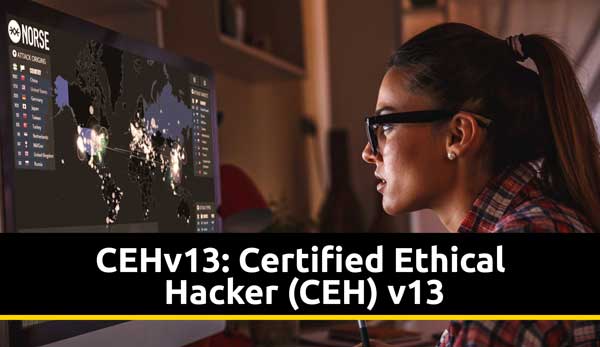
Module 01: Introduction to Ethical Hacking
Learn the fundamentals and key issues in information security, including the basics of ethical hacking, information security controls, relevant laws, and standard procedures.
Module 02: Footprinting and Reconnaissance
Learn how to use the latest techniques and tools for footprinting and reconnaissance, a critical pre-attack phase of ethical hacking.
Module 03: Scanning Networks
Learn different network scanning techniques and countermeasures.
Module 04: Enumeration
Learn various enumeration techniques, including Border Gateway Protocol (BGP) and Network File Sharing (NFS) exploits and associated countermeasures.
Module 05: Vulnerability Analysis
Learn how to identify security loopholes in a target organization’s network, communication infrastructure, and end systems. Different types of vulnerability assessment and vulnerability assessment tools are also included.
Module 06: System Hacking
Learn about the various system hacking methodologies used to discover system and network vulnerabilities, including steganography, steganalysis attacks, and how to cover tracks.
Module 07: Malware Threats
Learn about different types of malware (Trojan, viruses, worms, etc.), APT and fileless malware, malware analysis procedures, and malware countermeasures.
Module 08: Sniffing
Learn about packet sniffing techniques and their uses for discovering network vulnerabilities, plus countermeasures to defend against sniffing attacks.
Module 09: Social Engineering
Learn social engineering concepts and techniques, including how to identify theft attempts, audit human-level vulnerabilities, and suggest social engineering countermeasures.
Module 10: Denial-of-Service
Learn about different Denial of Service (DoS) and Distributed DoS (DDoS) attack techniques, plus the tools used to audit a target and devise DoS and DDoS countermeasures and protections.
Module 11: Session Hijacking
Learn the various session-hijacking techniques used to discover network-level session management, authentication, authorization, and cryptographic weaknesses and associated countermeasures.
Module 12: Evading IDS, Firewalls, and Honeypots
Learn about firewalls, intrusion detection systems (IDS), and honeypot evasion techniques; the tools used to audit a network perimeter for weaknesses; and countermeasures.
Module 13: Hacking Web Servers
Learn about web server attacks, including a comprehensive attack methodology used to audit vulnerabilities in web server infrastructures and countermeasures.
Module 14: Hacking Web Applications
Learn about web application attacks, including a comprehensive hacking methodology for auditing vulnerabilities in web applications and countermeasures.
Module 15: SQL Injection
Learn about SQL injection attack techniques, evasion techniques, and SQL injection countermeasures.
Module 16: Hacking Wireless Networks
Learn about different types of encryption, threats, hacking methodologies, hacking tools, security tools, and countermeasures for wireless networks.
Module 17: Hacking Mobile Platforms
Learn mobile platform attack vectors, Android and iOS hacking, mobile device management, mobile security guidelines, and security tools.
Module 18: IoT Hacking
Learn different types of Internet of Things (IoT) and operational technology (OT) attacks, hacking methodologies, hacking tools, and countermeasures.
Module 19: Cloud Computing
Learn different cloud computing concepts, such as container technologies and serverless computing, various cloud computing threats, attacks, hacking methodologies, and cloud security techniques and tools.
Module 20: Cryptography
Learn about encryption algorithms, cryptography tools, Public Key Infrastructure (PKI), email encryption, disk encryption, cryptography attacks, and cryptanalysis tools.
Students must have at least one year of hands-on experience in computer security. Students must also have a strong understanding of TCP/IP networking and modern operating systems. Certifications recommended prior to attending this class include A+, Security+, and Network+.
With 20 cutting-edge modules, you’ll gain the core skills needed to dominate the cybersecurity landscape. CEH isn’t just keeping pace—it’s leading the charge, evolving with the latest operating systems, exploits, tools, and hacking techniques to ensure you’re always ahead of the curve.
Dive deep into the future of cybersecurity with training that integrates AI into all five phases of ethical hacking, reconnaissance and scanning to gaining access, maintaining access, and covering tracks. You’ll harness the power of AI to supercharge your hacking techniques and disrupt AI systems—giving you 10x efficiency in your cybersecurity role.
CEH v13 isn’t just a certification; it’s a fully immersive experience. CEH combines comprehensive knowledge-based training with immersive hands-on labs to ensure a well-rounded learning experience. You’ll engage with live targets, tools, and vulnerable systems in a controlled environment, building real-world skills that empower you to confidently apply your expertise in any scenario. Get ready to transform the way you hack and protect the digital world!


